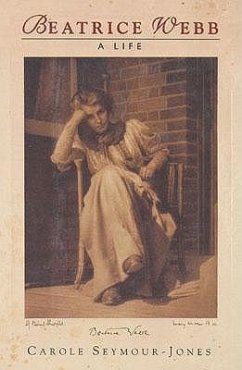This life of the brilliant and beautiful Beatrice is a very modern story of choices of socialism over love, and social commitment over social privilege. An intriguing biography of an independent Englishwoman with important reverberations for our own time. You ve got to buy this book. Carolyn See, Los Angeles Times.
"She was", George Bernard Shaw wrote, "a great citizen, a great civilizer, and a great investigator". For many she represented the triumph of the independent Englishwoman, for others little more than a heroic failure. But whatever responses Beatrice Webb provoked in her unusual life, she could scarcely be ignored. In this fine and sensitive new biography, Carole Seymour-Jones uncovers the brilliant and beautiful woman who renounced social position to fight for workers and slum dwellers in late-nineteenth-century London; who chose socialism over love and motherhood when she married Sidney Webb; who with Shaw was a founder of Fabian social reform; and who with her husband applauded Soviet communism in its early years. History has not been kind to Beatrice Webb, often caricatured as a puritanical social reformer. She was born in 1858 into a wealthy and privileged family. Passionate and emotional, she longed to be a mother yet gave up the one man she loved, Joseph Chamberlain, the dazzling leader of the Radical wing of the British Liberal party. Instead she chose socialism over love, marrying Sidney Webb, a Cockney hairdresser's son, in a brave act of class rebellion. All her life Beatrice fought the warring demons of her dual nature, suffering from anorexia nervosa and depression. But the world saw only her outwardly confident beauty, never her private agonies. Leonard Woolf said of her, "You could not see much of Beatrice without realizing that beneath the metallic facade of the surface and the polished certainty, there was a neurotic turmoil of doubt and discontent, suppressed and controlled, an ego tortured in the old-fashioned religious way". Her biographer calls Beatrice's story "avery modern one", because "it is a story of choices....She reworked the Victorian feminine ideal of the 'angel in the house' to follow her own original path as a social investigator...(and) she paid a heavy price". Ms. Seymour-Jones has written an intriguing biography with important reverberations for women in our own time.
Hinweis: Dieser Artikel kann nur an eine deutsche Lieferadresse ausgeliefert werden.
"She was", George Bernard Shaw wrote, "a great citizen, a great civilizer, and a great investigator". For many she represented the triumph of the independent Englishwoman, for others little more than a heroic failure. But whatever responses Beatrice Webb provoked in her unusual life, she could scarcely be ignored. In this fine and sensitive new biography, Carole Seymour-Jones uncovers the brilliant and beautiful woman who renounced social position to fight for workers and slum dwellers in late-nineteenth-century London; who chose socialism over love and motherhood when she married Sidney Webb; who with Shaw was a founder of Fabian social reform; and who with her husband applauded Soviet communism in its early years. History has not been kind to Beatrice Webb, often caricatured as a puritanical social reformer. She was born in 1858 into a wealthy and privileged family. Passionate and emotional, she longed to be a mother yet gave up the one man she loved, Joseph Chamberlain, the dazzling leader of the Radical wing of the British Liberal party. Instead she chose socialism over love, marrying Sidney Webb, a Cockney hairdresser's son, in a brave act of class rebellion. All her life Beatrice fought the warring demons of her dual nature, suffering from anorexia nervosa and depression. But the world saw only her outwardly confident beauty, never her private agonies. Leonard Woolf said of her, "You could not see much of Beatrice without realizing that beneath the metallic facade of the surface and the polished certainty, there was a neurotic turmoil of doubt and discontent, suppressed and controlled, an ego tortured in the old-fashioned religious way". Her biographer calls Beatrice's story "avery modern one", because "it is a story of choices....She reworked the Victorian feminine ideal of the 'angel in the house' to follow her own original path as a social investigator...(and) she paid a heavy price". Ms. Seymour-Jones has written an intriguing biography with important reverberations for women in our own time.
Hinweis: Dieser Artikel kann nur an eine deutsche Lieferadresse ausgeliefert werden.








